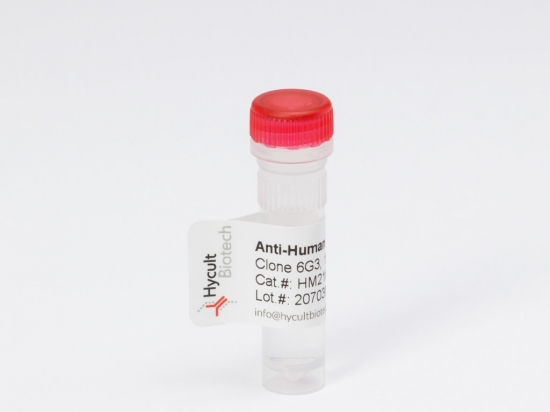Ephrin B4, Mouse, Monoclonal Antibody VEB4-7E4
- Supplier: Hycult Biotech
Product Description
- The monoclonal antibody VEB4-7E4 recognizes mouse Ephrin type-B receptor 4 (EphB4), an ~110 kD protein. Erythropoietin-producing human hepatocellular carcinoma (Eph) receptors and ephrins are membrane proteins. They are classified into 2 broad subclasses, namely A and B, according to structural homologies and binding specificities. Eph receptors are tyrosine kinases, which autophosphorylate upon binding to their cognate ephrin ligands. Eph receptors and ephrins are frequently expressed in reciprocal patterns that correlate with cellular boundaries during embryonic development. The interaction between EphB4 and its ligand, Ephrin-B2, plays an important role in cell-cell, cell-extracellular matrix interactions as well as in cell migration, adhesion and proliferation. During the early stages of vascular development, EphB4 is specifically expressed in venous endothelium, whereas Ephrin-B2 is expressed in arterial endothelium. In mouse embryo's, EphB4 and Ephrin-B2 are essential for embryonic heart development and angiogenesis. In adult microcirculation, EphB4 is not a ubiquitous marker of arterial/venous polarity, but is expressed along both venules and arterioles. Furthermore, EphB4 is upregulated by endothelial cells along blind-ended capillary sprouts versus connecting capillaries. As such, EphB4 is thought to play a role in the patterning of new vessels during angiogenesis. EphB4 is also expressed in a variety of tumor cells, like gastrointestinal, prostate, bladder, breast, liver, lung and ovarian cancers, as well as leukemia, mesothelioma, malignant breast tumors and melanoma. Reduction of EphB4 activity accelerated tumorigenesis in colon and rectum. In head and neck squamous cell carcinoma and endometrial carcinoma, overexpression of EphB4 is inversely related to a poor prognosis. However, in mesothelioma, up-regulation of EphB4 resulted in growth of the tumor. Besides the essential expression of EphB4, coexpression of other EphB4 family members or EphB-ligands may affect tumor cell viability and proliferation as well. The monoclonal antibody VEB4-7E4 marks venous endothelial cells, but not arterial endothelial cells in B16 melanoma cells.
- Applications: Frozen sections, Flow Cytometry , Immunoassays , Immunofluorescence , Western Blot
Resources
Product Options
| Product Number | Description | Package Size | List Price (CAD) | ||
|---|---|---|---|---|---|
| HYBHM109920UG | Ephrin B4, Mouse, mAb VEB4-7E4, 20 µg | 20 µg |
CA$274.40
|
Add to Cart | |
| HYBHM1099100UG | Ephrin B4, Mouse, mAb VEB4-7E4, 100 µg | 100 µg |
CA$1,026.00
|
Add to Cart |
List Prices are displayed.
Please register or log-in to the site to view your organization’s prices, or please add the products to your cart and click the “Request a Quote” button to receive price and availability information (include quantities for each product and indicate either a one-time purchase or your annual usage.)



